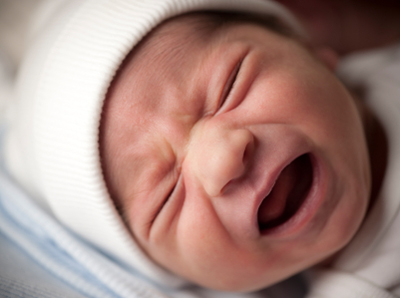Newborn Colic:
Turn Colic Into Frolic
Are you a victim of newborn colic? Does your baby start crying at the top of his/her lungs without any apparent reason? The diaper is clean and dry; the baby is well-fed and healthy; and the surrounding is calm - yet he continues to cry everyday, even for hours.
Could this be baby colic? Turn this colic into frolic and rollick (there has to be a reason why they all rhyme!).
What is colic?
Do you have a non-stop crying baby, in other words, a colic baby? Having a colicky newborn can definitely be distressing. The first and foremost approach should be to understand what newborn colic is, its symptoms and useful techniques to help your newborn cope well through the colic episodes. Newborn colic may be quite depressing for the mother, and in order to find its solution, you need to know what it actually is.
Symptoms of colic
So, what is colic?, and what are the symptoms of colic? It is usually characterized by bouts of crying and some abdominal pain (known as colic pain). With some newborns, crying may occur continuously for a significant amount of time. If your newborn is experiencing continuous crying periods and appears to be having abdominal pain and cramps, colic may be the culprit here.
To be honest, fully understanding why newborn colic occurs may not be entirely possible. You may hear doctors say that they are unsure about the origin of infant colic. What is certainly known is that it is quite normal for newborn babies to have colic.
Newborns are more likely to suffer from colic and the fact that your baby is less likely to suffer from colic as he gets older seems to suggest that the transition from the womb to other modes of feeding may have something to do with it.
Colic and digestion

It is believed that colic is related to the digestive systems of newborns that are adjusting to their new environment. As a parent or caregiver, the condition can be quite puzzling too because your newborn appears to be crying for no justifiable reason. You have fed, cleaned and made your baby comfortable, but the cries and discomfort still remain. The intense crying that your baby exhibits will give you the first hint that something out of the ordinary is afoot.
Also, another sign you may notice is unusual clenching of the fists. Due to the abdominal colic pain, your baby may be trying to cope and can react by becoming flushed around the face.
Colic remedy
What to do when your baby has symptoms of colic?
A doctor can examine your newborn and provide a diagnosis. If there are no indications of any other medical issues with your baby, the doctor will probably provide a diagnosis of baby colic.
If you suspect that your infant has colic or receive a medical diagnosis about it, what colic remedy can you provide?
- Firstly, don’t despair! Although it can seem like a really dire situation, a lot of babies, especially newborns have colic.
- Since there is really no solution to colic, comforting your newborn should be your main goal.
- Since newborn babies respond differently to different types of comfort mechanisms, determine what comforts your colicky baby. Examples include holding your newborn using a swaddle cloth or providing him with a warm bath.
- Ensure that feedings occur when your newborn is upright. This will help to minimize the tendency for the newborn to swallow a lot of air during feeding. Similarly, if you are bottle-feeding your newborn, make sure there are no air bubbles trapped inside the bottle.
- If your baby is four months or older and you have started giving him/her soft diet, make sure s/he does not intake hard to chew or hard to digest food items. Food with insoluble fibers like whole wheat products and pasta, high in lactose (milk, cheese, ice cream), broccoli, cabbage, and corn are some of the food examples that could be hard to digest. Also, if you want to make your little one try out spicy food, I am sure those tiny taste-buds can wait.
- While breastfeeding the baby, the mother should avoid eating food items that are either too spicy or hard to digest. Note if your baby is more colicky when you eat a certain food item, you should stay away from (or at least minimize if you can't completely ban) such foods.
How common is newborn colic?
My daughter used to get bouts of colic so much so that some friends of ours started calling her the colic baby.
Although colic is common, yet it is not ordinary. Sometimes your newborn may become inconsolable at the same time each day and the condition can last as short as a few weeks or as long as a couple of months. Try the above mentioned methods of preventing or minimizing newborn colic and do your best to keep your baby comfortable.
Return to Newborn Baby Health section.
Return from Newborn Colic to Homepage.




New! Comments
Have something to say about what you just read? Leave me a comment in the box below :)